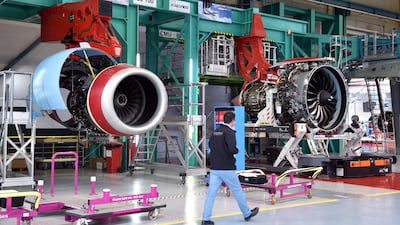France unveiled a €15 billion (Dh62bn) rescue plan for its aerospace industry on Tuesday in the hope of safeguarding 100,000 jobs and keeping European aviation competitive in the aftermath of the coronavirus pandemic.
In exchange for aid, companies will be required to invest more and faster in electric, hydrogen or other lower-emission aircraft as France aims to make its aviation sector the “cleanest in the world”.
Airlines and the manufacturers that supply them have been hit hard by the unprecedented disruption to international air travel brought on by the pandemic.
Shortly after the French announcement, the International Air Transport Association (IATA), which represents about 290 carriers, warned international airlines are due to make a combined net loss of more than $84bn (Dh308bn) this year.
"The losses this year will be the biggest in aviation history," said IATA director general Alexandre de Juniac.
"By comparison, airlines lost $31bn with the global financial crisis and oil price spike in 2008 and 2009. There is no comparison for the dimension of this crisis," he said.
"Financially, 2020 will go down as the worst year in the history of aviation."

Presenting France's plan to stave off the unprecedented economic damage, Finance Minister Bruno Le Maire said: "We must save our aerospace industry."
Mr Le Maire added that Europe would not sacrifice its place in the world market – symbolised by France-based plane-builder Airbus – to US rival Boeing or China's growing competitor, Comac.
“We won’t let the world aeronautical market be shared between China and the United States. France and Europe will retain their position.”
The rescue package includes direct government investment, subsidies, loans and loan guarantees. It also includes a special fund jointly financed by the government, Airbus and other big manufacturers to support small suppliers.
It includes €7bn in loans and loan guarantees that the government had already promised to Air France, where planes were almost entirely grounded by the virus.
And, like a similar multi-billion-euro plan to save the French car industry announced last month, the aviation bailout requires more investment in clean energy – and puts pressure on manufacturers to avoid layoffs.
It will aim at modernising the production chain and preserving European aviation know-how, Mr Le Maire said.
The deal was negotiated with unions, which said they would stay vigilant about job guarantees.
Some environmental activists expressed scepticism about green ambitions for such a high-emission industry.
The government was also talking to banks about how suppliers could manage surplus parts left stranded in the pipeline after decisions by Airbus and other manufacturers to slow production.
France said it had agreed with Britain, Germany and Italy a one-year moratorium on the repayment of the principal on aircraft loans backed by export credit agencies from March this year, a move worth €1.5bn.
Global aviation reeling from pandemic impact
Europe’s aerospace industry has been hit hard by the pandemic, which has brought air travel to a near standstill on the continent and beyond and left many of its airlines depending on government bailouts for survival.
As a result of the virus lockdown, Airbus said it is cutting production by 35 per cent to 40 per cent, and Boeing announced that it would cut 10 per cent of its 161,000-person workforce through attrition, early-out offers and layoffs.
“The recovery will be long,” Mr Le Maire warned. The government predicted it will be 2023 before the industry reaches pre-crisis levels.
But Mr De Juniac said IATA research "shows that people will return to flying as soon as borders open" and carriers had to be prepared for an orderly resumption once demand returned, in line with health guidelines.
"The outlook is challenging to say the least. But aviation is a resilient industry," Mr De Juniac said, and added that he was hopeful the sector "can rebuild the confidence of travellers and kick-start the recovery in aviation and more broadly".
The industry, he said, depended on a range of safety measures including more effective mass testing, which would "give governments the confidence to reopen borders without quarantine measures".
Mr De Juniac warned quarantine rules, such as those introduced in Britain this week, would damage the long-term prospects for aviation by effectively keeping travel "in lockdown".
The IATA had already warned in April that airlines faced an "apocalypse" without state aid and forecast that revenue would fall by about 55 per cent amid the sharpest fall-off in passenger demand since the 9/11 attacks in the US in 2001.
_______________












